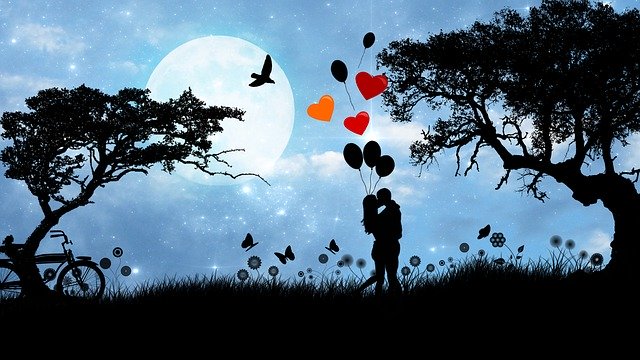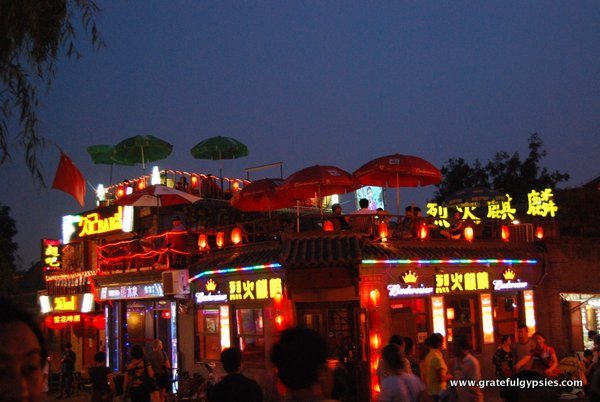Qixi Festival: China’s Romantic Holiday Posted by sasha on Aug 25, 2020 in Culture
Today marks the most romantic holiday on the Chinese calendar. In China, the seventh day of the seventh month on the lunar calendar is known as the Qixi Festival (七夕节 qī xì jié). This ancient Chinese festival goes by many names, including: the Night of Sevens, the Magpie Festival, and Qiqiao (乞巧 qǐ qiǎo). Many laowai refer to it as Chinese Valentine’s Day (情人节 qíng rén jié) due to its similarities with the Western holiday. As with most holidays in China, there’s an interesting story behind the Qixi Festival.
History of the Qixi Festival
The romantic story of Qixi tells of a cow herder (牛郎 niú láng) and a weaver girl (织女 zhī nǚ). The weaver girl was a goddess who came down from the heavens and fell in love with the mortal cow herder. They were secretly married and had two children together. When the weaver girl’s mother, the queen mother of heaven, found out about the marriage, she became upset. She came down to earth to take her daughter back up to the skies.
Obviously Niu Lang was devastated that his true love was gone. Thankfully one of his cows turned out to be a former god. The cow instructed Niu Lang to use its hide to create a pair of magic leather shoes. Niu Lang did just that when the cow died. He put his children in wicker baskets on a pole and flew up to the heavens with them.
It wasn’t exactly the happy reunion that Niu Lang was hoping for, however. When Zhi Nu’s mother found out what was going on, she used her hairpin to cut across the sky and form a river of stars known as the Milky Way (银河 yín hé). The lovers were separated as a result and it seemed as if all hope was lost.
The story doesn’t end there, though! Some magpies (鹊 què) heard the story of the star-crossed lovers and felt sympathy for them. As such, they banded together to form a Magpie Bridge (鹊桥 què qiáo). This allowed Niu Lang and Zhi Nu to meet on the bridge, and even her mean old mom was touched by this reunion. She said that every year on the 7th day of the 7th month, the lovers could meet on the bridge. And that’s where the Qixi Festival comes from!
Traditions of Qixi Festival
As with many festivals in China, Qixi has a history dating back thousands of years. In ancient times, girls would offer fruits to Zhi Nü to pray for dexterity in weaving in order to help them attract a husband.
Different regions in China have their own unique customs for the festival. For example, in Shaoxing Village (绍兴村 shào xīng cūn) near Hangzhou, girls will hide in a pumpkin patch at night. Those who can hear the whispers of Niu Lang and Zhi Nu will soon find true love. Check out this article in Chinese to read more about this and a few other interesting customs. It’s a great reading exercise!
One more modern tradition of the Qixi Festival is sending out a lantern (放花灯 fàng huā dēng). These can be small lanterns which are set out in a body of water, or the big ones that fly up to the sky. In Beijing, a great place to see this is around Houhai (后海 hòu hǎi) – a manmade lake in the city center and a popular place for couples to celebrate Qixi together.
Although this festival has been around for a long, long time, it tends to take a backseat to other more celebrated Chinese festivals, such as National Day (国庆节 guó qìng jié) and Spring Festival (春节 chūn jié). These days, Chinese love-birds celebrate the Qixi Festival in a fashion all-to similar to Valentine’s Day in the West – dinner dates, flowers, and candy.
In fact, most young Chinese probably won’t even be able to explain the legend of this holiday, as they are more concerned with celebrating the Western way. Thankfully, the history behind this ancient festival is much more interesting than a Hallmark card and a box of chocolates, and hopefully its traditions are preserved.
A Poem and a Video
Not surprisingly, this romantic festival has been the subject of many poems over the years. Here’s a great one called “Far, Far Away, the Cowherd” (迢迢牵牛星 tiáo tiáo qiān niú xīng):
迢迢牵牛星
皎皎河汉女
纤纤擢素手
札札弄机杼
终日不成章
泣涕零如雨
河汉清且浅
相去复几许
盈盈一水间
脉脉不得语
tiáo tiáo qiān niú xīng
jiǎo jiǎo héhàn nǚ
xiān xiān zhuó sù shǒu
zhá zhá nòng jī zhù
zhōng rì bù chéng zhāng
qì tì líng rú yǔ
hé hàn qīng qiě qiǎn
xiāng qù fù jǐxǔ
yíng yíng yī shuǐ jiān
mò mò bù dé yǔ
Far, far away, the Cowherd,
Fair, fair, the Weaving Maid,
Nimbly move her slender white finger,
Click-clack goes her weaving-loom.
All day she weaves, yet her web is still not done.
And her tears fall like rain.
Clear and shallow the Milky Way,
They are not far apart!
But the stream brims always between.
And, gazing at each other, they cannot speak.
If you want a challenging listening exercise, I found this video on YouTube where the speaker reads the poem out loud and explains it. The video is clearly meant for young Chinese students so it’s great for those of us who are trying to learn the language!
Now for a bit of entertainment, here’s a video I made a whole decade ago about the Qixi Festival. It includes some scenes of what Houhai looked like on that evening in Beijing as many couples came out to celebrate the romantic holiday.
To all the lovebirds out there, I’d like to wish you a Happy Qixi Festival (七夕节快乐 qī xì jié kuài lè)! And to all the single folks, your day will come in a few months on 11/11!

Build vocabulary, practice pronunciation, and more with Transparent Language Online. Available anytime, anywhere, on any device.






Leave a comment: